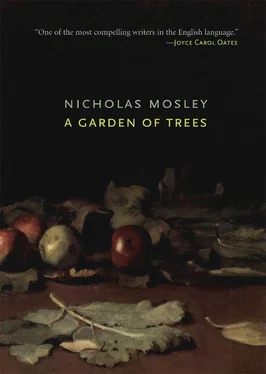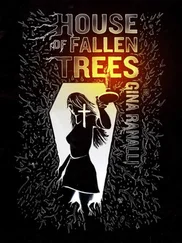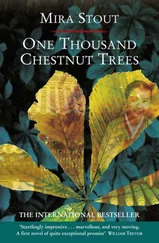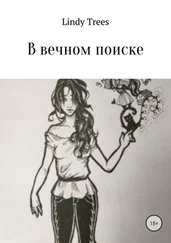Annabelle said: “The meeting ground has already been created. What is needed is the technique of finding it, not the technique of creating it oneself.”
“Of finding it then. It doesn’t matter. The act of creation has to be created again in each individual before he can find it. It doesn’t matter. Lose yourself and draw your symbols from the subconscious or the super- conscious or call it God, if you like, it’s all the same — any old tragedy will do. I know that you must have your God. I know what you mean by your first commandment. Have it then. But I will tell you this, that the technique is something different to that of the churches. The churches have never answered the question of technique. But art has tried to, and dancing has tried to, and we must go back to the savages for that. But savages have something of the technique without the desire to use it: or rather, they use it for fear. And we have the desire without the technique. It is this that one should study, perhaps — this subtlety of movement and attitude, this darkness of laughter, and use it for love. It is there, somewhere, hidden; and that is what will be new.”
There was a silence, and then Annabelle said: “Yes, but God is more than a word, and the first commandment is at least half of the technique, and although you may say what you like about churches there is another meaning of that word which might explain even more about the technique if it ever exists as more than a meaning.”
“Which it doesn’t,” Marius said.
“I don’t know. But it exists as a symbol, and that is my symbol. Whether it exists as more I don’t know because I have never tried it.”
“Tried what?” Marius said.
“Tried to lose myself in the meeting-ground which is not just a word but which is the first commandment.”
“Oh hell,” Peter said. He sat up suddenly. “And I’ll tell you this, that it is easier to get lessons in dancing that it is to love God. Three guineas in Oxford Street and you can jump like a bloody savage. But three prayers to God and all you get is a crick in the back. And a kick too, most likely. I know because I’ve tried it.”
“You haven’t,” Annabelle said.
“I have. And I tell you that I can jump but I can’t love God, and I don’t always hit my head on the ceiling, either.”
“It was you who asked the question,” Annabelle said. “How to help others and how not to be alone.”
“And it is you who have not answered it. You say you must lose yourself, Marius says through dancing and you say through God, and I say that if I have to choose between being a savage who cuts up his children and an ascetic who cuts up himself, then I would rather stick to my donkey and try to train it into a horse. I stick to that symbol, and to hell with the rest.”
“As a matter of fact,” Annabelle said, “you do not stick to your donkey, and you do care about other people, and you could not bear it if you were on your own.”
“To hell with the rest,” Peter said.
“You said at the beginning that you are not living if you stick to your donkey. You know that that is true and that you yourself would always live for other people and in fact do more for other people than you will ever admit or imagine.”
“To hell with everything,” Peter shouted. “And to hell with me. If you dare to flatter me I shall cry.”
“I suppose we shall behave now as we should have behaved anyway,” Marius said, “whatever are the words that we have used.”
“Then give me the brandy,” Peter said, “and to hell with words.”
“It is you this evening who have danced and who have loved,” Annabelle said.
“I told you I should cry,” Peter said. “And now will you play the piano, please, very sadly, so that my tears may be mistaken, as they will always be mistaken, I hope, for the tears of either brandies or pianos. And let us behave, for a little, as you say, as we should anyway behave, but won’t, because of our symbols and our nonsense and the things that we can never understand and can never even hope to. You can play a psalm and Marius can croon like a negro and I will make a noise like a lonesome and tragic ass. Then, indeed, we will have created a reflection of eternity. And I still think that I know more about life than the whole bloody lot of you put together.”
Annabelle played the piano.
7
In the days that followed I was with them, often, meeting for coffee in the mornings as a substitute for breakfast, and buns in the afternoon as a substitute for lunch. I do not think we ever ate properly except in the evenings, when Annabelle would cook us large quantities of buttered eggs in the flat, or we would go to some foreign restaurant which Peter had heard was excellent, and there eat the chopped cabbage, the skewered gristle, the queer pancakes, in which such foreign restaurants excel. Meals are the standard by which the duration of the day is timed, so that with the neglect of eating the days themselves became haphazard, passing quickly, almost unnoticeably, and becoming muddled with the nights. Emerging from a door, or drawing the curtains of a window, it was often a shock to find that the dawn, or the dusk, had crept up on us without warning, and that the scene we had expected had been transformed into either the candle-light of evening or the pale arena-like glare of early morning. Marius usually was away during the day, engaged upon some business about which I never quite discovered, but he would join us at night wherever we were, and he had a fortunate faculty for interpreting the garbled and often contradictory messages that we left behind us at the flat. Whether we were with him, or away from him, it was always the same. I think that in all our lives this spring was a queer interlude in which time became a vacuum, and we were all waiting for something to happen, whatever it would be.
Of our lives before this time we never talked, although we seemed to talk of everything else, and it was not until long after that I learnt some of the details of Peter’s and Annabelle’s childhood. I never learnt much about Marius’s. He was older than us, and always mysterious. I think he was about thirty when we knew him. I learnt something about him, later, from his wife. But from the other people who knew him before he met Peter and Annabelle I never discovered a thing. They told me a lot about themselves, about how they reacted to Marius, but they never answered questions about Marius himself. He had that effect on people. He made them think about themselves, but never gave anything away.
He had lived most of his life in the West Indies, in a big house by the sea. He had come over to England in the war, as Alice had said, with his wife, and his wife was ill, and she had gone to hospital. Then he had lived alone, busying himself with a number of things that interested him, and being taken up by people who dropped him as soon as he disappointed them, and who usually returned at intervals to dig him up again only to retire in increasing bafflement when he would not submit to their plans. He intrigued people and at the same time infuriated them, for although they sensed that he was an extraordinary person they could not tell where his power lay. I have heard people talk of him as if he could have been anything, or again as if he were a wastrel without any power at all. But he was the kind of person who all his life is treated as a celebrity, although I do not think he was anything of a celebrity until the end.
When he had met Annabelle and Peter he went to live with them. I do not suppose that they talked much about this, either; he just stayed one night in the spare room of the flat that belonged to their parents and went on staying there on and off for the next six months. Their parents were away — their father was at that time the governor of some colony in Africa — and they had left their home in London for the use of their children. Annabelle was eighteen and Peter twenty, and Peter had come home previously to do his service in the army. This he had done, and Annabelle had come with him to look after the flat, and to be introduced to London by a series of relations.
Читать дальше












